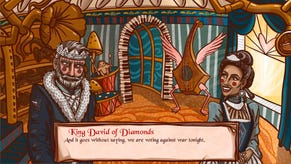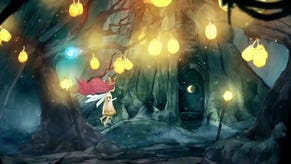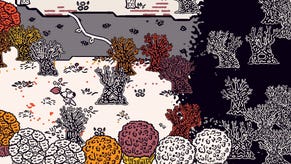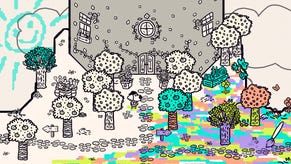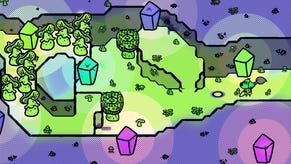Games that avoid capitalistic design
Bad news for Tom Nook.
In November 2021, narrative designer Megnha Jayanth posted a transcript of a talk entitled "White Protagonism and Imperial Pleasures in Game Design" online. In it she argues that games are deeply rooted in Anglo-American and European imperialism. It's a complex argument, and I highly recommend you read the whole essay, but there is one point in particular I latched onto - games, according to Jayanth, are difficult to extricate from capitalism and colonialism, seeing as the tastemaking cultures in the industry are both.
There are many ways in which capitalism has an influence on the industry; here I'm going to focus on design. Monetisation and play-to-earn structures are two especially egregious forms of capitalism that are hotly debated, but less obvious forms of capitalism exist in most popular video games. There are obvious examples in which games put us to work, like the cycle of work and consumption in Animal Crossing that many memes make fun of even as we enjoy it, or management games and city builders. But work is also inherent in filling a skill tree, or a progress bar. The satisfaction you feel at levelling up is engineered by an inherently capitalist reward loop - you've worked hard for something, so as a reward you're granted something with which to do more work.
However, many games are fun because, unlike at many points in real life, the work we put in brings visible results. Interactivity allows for creative forms of self-expression that mean your farm in Stardew Valley, your island in Animal Crossing: New Horizons, your factory in Factoria, they are uniquely yours. But with marketing campaigns selling us the possibility of 500 hours of game time as fun for an especially dedicated (note the word choice!) bunch of people, and the recontextualization of binging and grinding to become something positive, it's worth asking if games, too, can't offer alternatives to the cycles that keep you working. To that end, I've spoken to some designers of recent games that many players and critics noted for their kindness - the link between kindness and anti-capitalist design often isn't incidental.
Greg Lobanov and company designed Chicory out of the desire to find a fun painting mechanic in video games first and foremost. Seeing as it is a story about a painter buckling under the weight of expectation, however, it's no surprise that Chicory came out anti-capitalist in its design. It would have been easy to make the game more capitalist, Lobanov tells me, because currency slots easily into many types of games, whether that's experience points, skill points or references to trade. "We avoided any kind of renewable resource, which means there is nothing for players to grind on forever, which changes the relationship with the game a lot." Even litter and outfits can be picked up only once, even if no one would have questioned litter reappearing. But Lobanov was happy to give players freedom, the freedom to colour only as much as necessary or as much as they like, the freedom to pick up collectibles or leave them - and yet everyone would experience the ending the same way.
Freedom is an important anti-capitalist notion in association with games. Capitalist structures fill your time - if you don't log on, you miss out, if you miss certain items, you stay weak. Again, all of these things can be fun, but a lot of capitalism is built on the notion that doing something is always preferable to doing nothing.
But doing nothing, as antithetical as it sounds to an interactive experience such as a video game, is a great way to help you refocus, to raise awareness to the fact that you can exist without generating anything for anyone. I always like to use the meditation sequences in Giant Squid's Abzû as an example, as they did nothing but bring me joy by looking at the creatures around me, just like a painting can give you joy simply by looking at it.
The one game that's come up a lot last year in reference to freedom is Shedworks' Sable. Sable retains some trade mechanics, but as creative director Gregorios Kythreotis tells me, Sable's true focus is the coming-of-age journey of its protagonist. Sable isn't a hero, which means no one depends on her progress. The world will keep turning if she decides to take it easy. Taking it easy isn't in the capitalism playbook. As exemplified most popularly by the American Dream, any moment you pick yourself up by the bootstraps could be the one - you could have the next big idea, you could be someone, you could have it all. Or you could simply be what you are in the moment, and stare into a brightly coloured mountain range. "We wanted this world to encourage and support young people in their self-exploration and designed the game around this," Kythreotis says. "You're also free to ignore certain requests. You can finish the game and the only things we require the player to do is the opening and the ending, because everything else is optional, hopefully that makes it feel more like a favour than an obligation."
The crux of the matter is that capitalism isn't going anywhere, and the point of this article isn't to make anyone feel bad about the systems that while intrinsically connected to it still bring you joy. But diversity, or even just the attempt at something new, can make our medium richer. To that end, it may be possible to soften certain capitalist concepts without erasing them altogether. I've written a fair bit about Echodog's Signs of The Sojourner, not only because I like its core gameplay idea of turning conversations into gameplay, but also due to its worldbuilding and how it treats trade, so I spoke to Echodog founder and creative director Dyala Kattan-Wright.
"While we didn't start with explicitly thinking about trade systems or resisting capitalism, the environmental and social themes naturally set led to that point," she tells me. In Signs of the Sojourner, a caravan bridges the gap between different communities, delivering and trading wares. A natural disaster further complicates the caravan's efforts. "We were intentionally vague about how a lot of the transactions are happening. Sometimes the things you receive are gifts, sometimes it's implied there was a monetary transaction that just wasn't meaningful to include in the conversation in any way. You're probably bringing home staples along with weird snack foods that we just never mention." Like in Sable, the journey is the destination, and while the weird tidbits you bring back are earned in a way, they are then used to help people elsewhere. It all feels very much like bartering. At one point, Kattan-Wright also successfully manages to read my mind: "I suppose simply not making it about growth and profit is already a much more positive take than the norm."
I've read a lot last year about the bafflement of underpaid workers quitting their jobs in droves, about living wages that don't allow people to live, or the increasing number of people who burn out. Games can't offer answers to any of these problems, in part because these problems all exist in our industry. But games can acknowledge their own systems and offer alternatives, and if we can find alternatives here, through sheer design ingenuity, who says we can't do it somewhere else? "Similar to how we approached environmental catastrophe, we wanted to acknowledge these huge challenges that can often feel impossible to tackle, but placed in a world with people and communities who have or are starting to find and incorporate solutions," Kattan-Wright says. "While building relationships and bringing people together isn't itself a solution, it's a good first step that we wanted to reflect in the mechanics and narrative." That for me is the crux of what it comes down to - design reflects intent. Similar to matters of accessibility, we don't have to have it all figured out - the design process is a lot of testing, balancing and testing again - but we can show intent.
We already know what works - combat works, trade systems work - and it's a huge gamble to try and figure out new systems that engage us as players and as audiences in a thoughtful way. But the examples are there.





